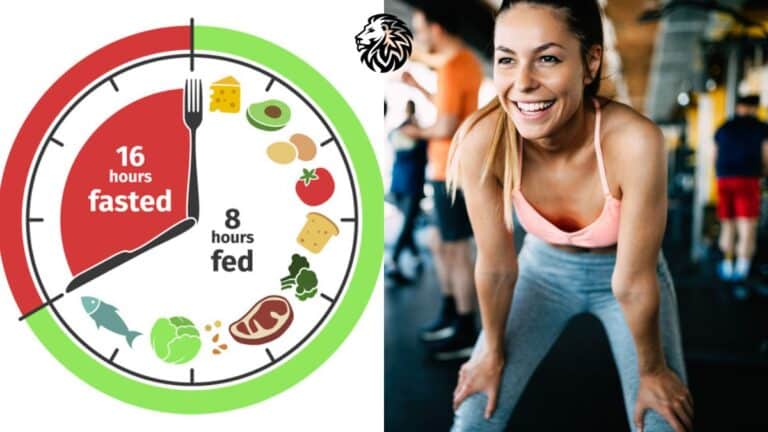Fed up with endless calorie counting and restrictive meal plans? Intermittent Fasting and Fat Loss go hand in hand, offering a simpler, more flexible approach to achieving your goals. By focusing on when you eat rather than what you eat, this method helps your body tap into its fat stores more effectively. Backed by research and embraced by people looking for sustainable results, intermittent fasting not only supports fat loss but also improves overall health. If you’re ready for a straightforward way to shed pounds and feel better, it’s time to explore how intermittent fasting can work for you.
Intermittent Fasting for Weight Loss
How Well Intermittent Fasting Works
Ditching those stubborn pounds might not be such a head-scratcher with intermittent fasting (IF) as your sidekick. A peek into 40 studies tells us IF can help you drop around 7-11 pounds over about 10 weeks, so it packs a punch.
Different strokes for different folks, right? Whether it’s time-restricted eating or alternate-day fasting, the outcomes speak for themselves. One study in the Annals of Internal Medicine claimed folks doing time-restricted eating lost about 10 pounds more than the ones in their control group over a year (NPR Health Shots).
Besides nudging the scale in your favor, intermittent fasting brings along other health perks. It boosts metabolic health and helps keep your appetite in check. And hey, forget the math—no calorie counting or banning favorite treats involved (Healthline).
Intermittent Fasting vs. Cutting Calories
When you put intermittent fasting head-to-head with just slashing calories, a study over a year showed their weight-loss results weren’t far apart. The time-restricted bunch dropped an average of 18 pounds, while the calorie-watchers lost about 14 pounds (Harvard T.H. Chan School of Public Health).
| Method | Average Weight Loss (lbs) |
|---|---|
| Intermittent Fasting (16/8 Method) | 18 |
| Calorie Cutting | 14 |
Both methods sit in the same ballpark, so the choice is often about what fits into your daily grind. If counting every calorie exhausts you, maybe IF is your jam. On the other hand, if long fasting spells make you sweat, calorie counting might be your thing.
Big helpings of guidance from a dietitian played a big role in making both strategies work well (NPR Health Shots). If you’re curious to dig deeper, swing by our intermittent fasting studies section.
Want to hit the ground running with IF? We’ve got your back! Head to our pages on intermittent fasting meal plan and intermittent fasting tips to kick-start your weight loss adventure.
Types of Intermittent Fasting
Intermittent fasting (IF) isn’t just a fancy term; it’s like choosing your own adventure in the eating world. We’ve got a few fan favorites to chat about: Time-Restricted Eating, the 16/8 Method, and the 5:2 Approach.
Time-Restricted Eating
This one lets you gobble up all your meals in a tight time slot each day. It’s a bit like Cinderella, but instead of a carriage, you’re chasing calories. Studies show IF, especially time-restricted eating, works wonders for shedding pounds, much like the classic calorie-counting grind (NPR Health Shots). Plus, it flips your body’s energy game, swapping sugar highs for fat and ketone boosts, helping you dodge health downs like type 2 diabetes and heart hiccups.
| Eating Hours | Fasting Hours |
|---|---|
| 8 AM – 4 PM | 4 PM – 8 AM |
| 10 AM – 6 PM | 6 PM – 10 AM |
| 12 PM – 8 PM | 8 PM – 12 PM |
16/8 Method
Think of the 16/8 method as your eating buddy that knows when to call it a night. It’s a part of time-restricted eating that’s all about keeping things chill. You fast for 16 hours, then let loose for 8. Many folks jumpstart their meals at noon and ride the meal train until 8 PM.
Folks on this path often grab some chatter time with dietitians to nail down food smarts and avoid the rebound blues. Speaking to a healthcare pro is a smart move, especially if you’re juggling health stuff (Johns Hopkins Medicine).
5:2 Approach
Then there’s the 5:2 method — the weekend never looked so good! You chow down like any other human for five days, then give your meals a snuggle on two days by sticking to around 500-600 calories. It’s like a cheat method for being “good” without losing the regular munchies for the rest of the week.
Whether you choose to slash calories or mix it up with intermittent fasting, studies say both are winners for losing some love handles, showing similar outcomes from 4.6% to 13.0% over an 8-week to 1-year span. Both have a good stick-with-it factor, making them solid picks for a weight drop endeavor.
Got a taste for more meal strategy action? See our tips over here intermittent fasting tips and intermittent fasting meal plan to stay on the winning side of this feast gig.
Benefits and Challenges
Health Benefits of Intermittent Fasting
Intermittent fasting (IF) doesn’t just sound like some fancy diet fad; it’s a powerhouse for kicking unwanted pounds to the curb. And hey, who wouldn’t want to scorch fat off their sides and give insulin a run for its money? Here’s the scoop on what IF can do for you:
- Melt Away Unwanted Fat: Want to lose weight without the endless gym torture? Your body, when it’s done sipping sugar, does a turnaround and starts snacking on fat, thanks to something that smarty-pants researchers call “metabolic switching”. It’s a nifty trick to flatten those love handles, especially around the belly.
| Health Benefit | Description |
|---|---|
| Weight Loss | Gives fat the boot via metabolic switching |
| Better Insulin Sensitivity | Knocks down insulin levels, improves those insulin-producing cells (NCBI) |
| Slashes Inflammation | Helps stomp out chronic inflammation and other nasties (Johns Hopkins Medicine) |
| Live Longer | Could add years to your life by tidying up your cells |
- Boost Your Insulin Savvy: If you’re on the edge of diabetes, IF steps in like a superhero to enhance insulin awareness and chop insulin levels down to size.
- Douse Flames of Inflammation: This fasting gig doesn’t just stop bellyaching but plays a role in vanquishing diseases like type 2 diabetes, heart disease, and even pesky brain fog.
- Stay Sharp and Live Longer: IF might just be your ticket to a longer life and a sharper brain.
Common Challenges of Intermittent Fasting
Okay, while we’re all jazzed about the perks, let’s keep it real: IF isn’t a walk in the park and poses a few hurdles that might trip you up:
- Hankering for Snacks: Your belly might grumble and growl like a wild beast during fasting, tempting you into a kitchen raid.
- Social Butterflies Beware: Those party invites and eat-outs threaten to throw your fasting schedule right off track.
- Drained Battery Alert: Especially when you’re starting out, don’t be surprised if your energy takes a nosedive along with your spirits.
Long fasts stretching to a whole day or more can be tough, borderline insane, and might not fit everyone like a glove (Johns Hopkins Medicine).
| Challenge | Description |
|---|---|
| Hankering for Snacks | Resisting those munchies during fasting is no joke |
| Social Butterflies Beware | Going social might mess with your fasting plan |
| Drained Battery Alert | You might feel like a deflated balloon at first, with energy dips and mood swings |
Get ahead of these hurdles with a game plan that matches your vibe. More on this can be found in our piece on tips for sticking to your intermittent fasting goals.
Try following a set intermittent fasting schedule to smash through stumbling blocks. Chat with your doc and consider adding some intermittent fasting supplements to make it a breeze.
Look at the upsides and the hiccups before diving headfirst into IF for your weight loss adventure. If you’re hungry for more insights, check out our deep dive on intermittent fasting benefits.
Studies and Research Findings
Impact on Weight and Metabolic Health
So, you’ve heard that intermittent fasting (IF) might be your ticket to dropping some pounds and fine-tuning that metabolism of yours. But what’s the real deal here? A year-long study checked out IF, particularly the 16:8 method, and found that it wasn’t a magic bullet compared to just cutting calories without a time limit for folks dealing with obesity. Let’s break down what they saw in terms of weight, waist size, and BMI:
| Group | Weight Loss (lbs) | Waist Drop-Inches | BMI Fall | Blood Sugar Drop |
|---|---|---|---|---|
| With Time Restrictions | 18 | 2 | 1.2% | 5 mg/dL |
| No Time Restrictions | 14 | 1.8 | 1.0% | 4 mg/dL |
Loads of other studies feel pretty good about IF claiming it can curtail your appetite and help you feel fuller, which might just kick hunger—and pounds—to the curb. And for anyone with type 2 diabetes, IF might help lower those pesky HbA1C levels. Some even ditched insulin therapy altogether, seeing real weight loss and better sugar control compared to constantly cutting food intake.
Adherence and Long-Term Sustainability
Can you stick with IF without pulling your hair out? You bet. It might be the simpler route, freeing you from counting every calorie or axing your favorite munchies. IF meshes nicely if you’re into a balanced, whole-foods diet, and it plays well with resistance training and a solid protein intake.
Peeking into a bunch of studies, both IF and calorie-cutting diets showed similar dedication—and nearly parallel weight loss rates, dropping between 4.6% to 13.0% over periods from a couple of months to a whole year. Yep, either way, you’re likely to stick with it if you want to shed some pounds.
Curious how to keep it up with IF? Check out our guide here for some handy tips. And maybe boost your IF game with some intermittent fasting supplements.
Thinking about jumping on the IF train? Have a chat with your doc first to make sure it jives with your health goals. Need more tips on getting started? We’ve got an article on intermittent fasting for beginners ready for ya.
Implementing Intermittent Fasting
Chat with Your Doctor
Before jumping into intermittent fasting to shed some pounds, it’s really smart to check in with your doctor. This is a must if you’ve got health issues or if fasting makes you feel jittery, gives you headaches, or makes you queasy. Your doc may say to ease into it with something like just eating within a certain time frame before going hard-core with something like fasting every other day. Keep an eye on things, especially if you’re on meds like insulin – it might require some tweaks. Not everyone’s a fan of fasting, so getting a pro’s opinion can help dodge any awkward surprises.
Handy Tips for Nailing Intermittent Fasting
Wanna rock that intermittent fasting? Here’s some friendly advice to keep you on track:
- Keep Meals Simple: Fasting lets you skip all that calorie counting hassle. Don’t think too hard about what you should eat, concentrate on when you should chow down. Easy peasy!
- Go for Real Foods: Fill your plate with wholesome stuff. When you team up healthy food with fasting, you might see even better weight loss results. A double win!
- Add Some Sweat: Pair your fasting plan with some good old exercise. Resistance training mixed with high-protein meals is a match made in muscle gain heaven. Check out our page on intermittent fasting and muscle gain for more tips.
- Find Your Fasting Crew: Chatting with a dietitian can totally help. They’re great at showing you the healthy ropes and helping you avoid slipping back into old habits. A little support goes a long way, right?
- Stick with It: To win at weight loss with fasting, sticking with it is the secret sauce! Folks who commit to routines like time-restricted eating tend to keep at it better, even when the going gets tough.
Try weaving these tips into your fasting plan and see what grooves look best on you. For more fasting hacks and different styles of fasting, check out our other articles to find a fit for your life. Just keep in mind – your health and happiness are what really matter in this whole weight thing.







